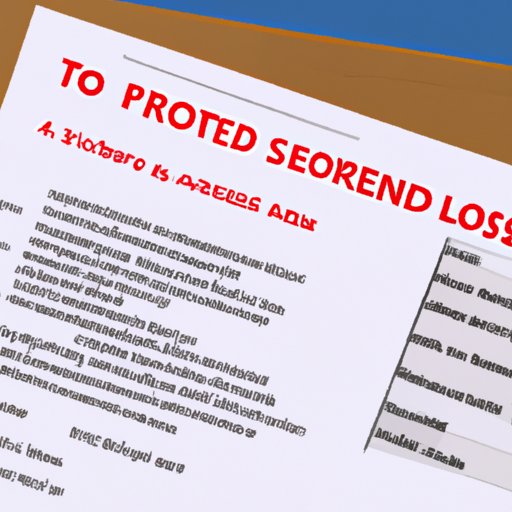Introduction
When it comes to selling a home, a short sale is an attractive option for some homeowners. But what exactly is a short sale and how does it work? In this article, we’ll explain what a short sale is and provide a step-by-step guide on how to navigate the process.
A Step-by-Step Guide to Understanding the Short Sale Process
The short sale process can be complex and time-consuming, so it’s important to understand each step before moving forward. Here’s a breakdown of the key steps:
Step 1: Contacting Your Lender
The first step in a short sale is to contact your lender and explain your financial situation. You’ll need to provide evidence of your hardship, such as a job loss or medical bills, and explain why you’re unable to make payments. Your lender will then determine if they are willing to consider a short sale.
Step 2: Obtaining an Offer
Once your lender has agreed to a short sale, you’ll need to obtain an offer from a potential buyer. The offer must be accepted by both you and your lender in order for the sale to go through.
Step 3: Negotiating with Your Lender
If the buyer’s offer is not enough to cover your mortgage balance, you’ll need to negotiate with your lender to get them to accept the offer. Your lender may be willing to reduce the amount you owe or waive certain fees in order to make the sale more attractive.
Step 4: Closing the Sale
Once all parties have agreed to the terms, the sale can be closed. You’ll need to sign paperwork to transfer ownership of the property to the buyer and the sale will be finalized.
What is a Short Sale and How Does it Work?
A short sale is an alternative to foreclosure that allows homeowners to sell their property for less than its full value. It’s a way for homeowners to avoid foreclosure and settle their debt with their lender without having to suffer the consequences of a foreclosure.
Definition of a Short Sale
A short sale is when a homeowner sells their home for less than what’s owed on the mortgage. The proceeds from the sale go to the lender to pay off the remaining balance of the loan. The lender then writes off the difference between the sale price and the amount owed as a loss.
Benefits of a Short Sale
There are several benefits to a short sale. For one, it can help homeowners avoid foreclosure and the associated damage to their credit score. Additionally, a short sale can help homeowners settle their debts with their lender without having to declare bankruptcy.
Risks of a Short Sale
While there are many benefits to a short sale, there are also risks involved. One risk is that the lender may still pursue legal action against the homeowner after the sale is complete. Additionally, the homeowner may still have to pay taxes on the amount forgiven by the lender. According to Mark Steber, Chief Tax Officer at Jackson Hewitt Tax Service, “The IRS considers the amount forgiven in a short sale to be taxable income.” 1
The Pros and Cons of a Short Sale
Before deciding to pursue a short sale, it’s important to weigh the pros and cons. Here are some of the key advantages and disadvantages of a short sale:
Pros of a Short Sale
- Avoids foreclosure and damage to credit score
- Helps settle debt with lender
- May be able to save some money
Cons of a Short Sale
- Time-consuming and complex process
- Lender may still pursue legal action
- Taxes may be due on forgiven amount

How to Negotiate a Successful Short Sale
Negotiating a successful short sale requires patience and persistence. Here are some tips for negotiating with your lender:
Understand Your Options
It’s important to understand all of your options before negotiating with your lender. Speak with a real estate attorney and financial advisor to make sure you fully understand the process and the possible outcomes.
Know Your Rights
Make sure you know your rights as a borrower. The Consumer Financial Protection Bureau (CFPB) provides resources to help borrowers understand their rights during the short sale process. 2 Educate yourself about the process and don’t be afraid to ask questions.
Get Professional Help
Hiring a professional to help you negotiate with your lender can be beneficial. A real estate attorney, financial advisor, or a HUD-approved housing counselor can help you understand the process and ensure that you get the best outcome possible.
A Homeowner’s Guide to Navigating the Short Sale Process
Navigating the short sale process can be challenging, but there are steps you can take to make the process smoother. Here’s a guide to help you along the way:
Gather Necessary Documents
Your lender will require documentation to prove your financial hardship. Gather any relevant documents, such as bank statements, pay stubs, tax returns, and medical bills. This will help strengthen your case and make the process easier.
Prepare a Hardship Letter
Before negotiating with your lender, prepare a hardship letter explaining your financial situation. Be honest and include details about your circumstances and why you’re unable to make payments. This will help your lender better understand your situation.
Consider the Tax Implications
As mentioned earlier, the IRS considers the amount forgiven in a short sale to be taxable income. Speak with a tax professional to make sure you understand the tax implications of a short sale and how it will affect you.
Conclusion
A short sale can be a good option for some homeowners who are struggling to make mortgage payments. It can help them avoid foreclosure and settle their debts with their lender while avoiding some of the negative consequences of foreclosure. However, it’s important to understand the process and the risks involved before taking the plunge. By following the steps outlined in this article, homeowners can better understand the short sale process and increase their chances of a successful sale.
For more information, check out the CFPB’s guide to short sales. 3
Sources:
1. Jackson Hewitt: What is a Short Sale and How Does it Work? https://www.jacksonhewitt.com/tax-resources/what-is-a-short-sale/
2. Consumer Financial Protection Bureau: Short Sales https://www.consumerfinance.gov/mortgage/short-sales/
3. Consumer Financial Protection Bureau: A Homeowner’s Guide to Short Sales https://files.consumerfinance.gov/f/documents/201607_cfpb_Homeowner_Guide_to_Short_Sales.
(Note: Is this article not meeting your expectations? Do you have knowledge or insights to share? Unlock new opportunities and expand your reach by joining our authors team. Click Registration to join us and share your expertise with our readers.)
